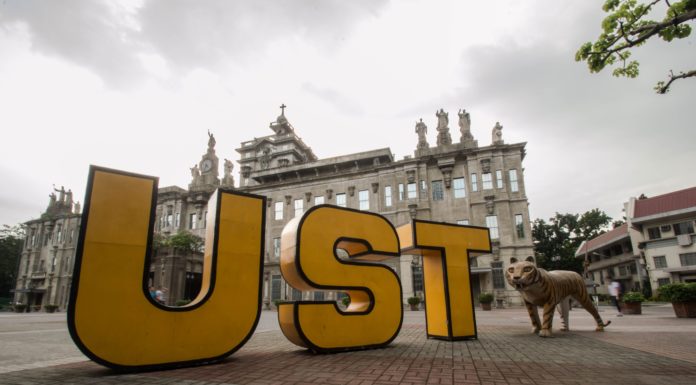THE CENTRAL Student Council (CSC) and the Central Board of students have rejected the administration’s proposed five- to eight-percent tuition increase during a consultation last Feb. 20.
Civil Law Student Council President and Central Board Speaker Victor Villanueva vowed to prevent the implementation of the proposed tuition increase, which he said was unjustifiable.
“Our objections will not end today. If the administration pushes through with the proposed increases, which we think are largely unjustified, we will continue to assert our objections,” he said.
Villanueva said thousands of Thomasians had expressed their dismay regarding the proposed tuition hike, particularly on social media site Twitter by using the hashtag "#AyokongMagmahal," which became a top trending topic in the Philippines last Feb. 19.
“It is in the best interest of the students that the University continues its operations [but] we assert that the University can continue to maintain its operations with the present rate of tuition,” Villanueva said.
The proposed increases for academic year 2015-2016 amount to P67 per unit for first-year students, P100 per unit for second-year students, P101 per unit for third-year students, and P64 per unit for fourth- and fifth-year students.
According to Christine Nicolas, officer-in-charge of the Office of the Internal Auditor, P47 out of the P67 increase for first-year students would go to the salaries and benefits of University personnel.
Nicolas recalled that during the academic year 2013-2014, tuition collected were distributed as follows: 17 percent for salaries and benefits, 12 percent for improvements, 3 percent for maintenance, 2 percent for supplies and equipment, and 13 percent for other operating expenses.
For the incoming academic year, Nicolas said miscellaneous expenses for the College of Nursing, College of Rehabilitation Sciences, and Faculty of Pharmacy will increase by 50 percent. For all other colleges, the increase is 30 percent.
Renovations done in the University this academic year, such as lecture room conversions, upgrading of offices and comfort rooms, and installation of closed-circuit television cameras around the campus are some of the administration’s justifications for the proposed fee increases for the next academic year.
On Feb. 26, student council presidents from several faculties and colleges of the University reiterated their objection to the tuition hike in an official statement released online.
“This objection was clearly manifested by the student council presidents during the tuition consultation meeting last Feb. 20, in the presence of several University administration officials,” the statement released on Facebook read.
Student leaders described the consultation as simply a formality to comply with the Commission on Higher Education's Memorandum Order No. 8 s. 2012, which required colleges or universities proposing an increase in school fees to conduct a consultation with students before Feb. 28.
“It was repeatedly said to us that what we were having was a ‘conversation’ as if to emphasize that the point was not to consult us or get our consent, but to convince us that the tuition increase is acceptable. We insist, it is not,” the statement read.
During the consultation, the Office for the Vice Rector for Finance, headed by Fr. Manuel F. Roux, O.P., disclosed that UST collected at least P2.9 billion in tuition, nearly P650 million in other fees from students, almost P300 million from auxiliary services, and around P200 million in interest income and other sources in academic year 2012-2013.
“Deducting all expenses of the University, at least P900 million remain as surplus for each academic year,” the student leaders claimed.
Student council officials said the administration had explained that the surplus money was meant to be used as “buffer funds” or “working capital” for contingencies. They however argued that the amount was too much for a non-stock and non-profit educational institution like UST.
“The bottom line is, the tuition increase is not necessary. Any increase is exorbitant. Our primary consideration should always be the students, the most important sector of any institution of higher learning,” the statement said.
The statement was signed by student council presidents Victor Lorenzo Villanueva (Faculty of Civil Law), Erica Jaira Sanico (College of Commerce and Business Administration), Michelle Baluyot (Faculty of Medicine and Surgery), Jayvee Del Rosario (College of Accountancy), Juan Carlo Dela Paz (College of Education), Diana Angela Dela Victoria (College of Architecture), Carlo Martin Dequina, (College of Fine Arts and Design), Nielsen Ignacio, (Faculty of Engineering), Maria Jann Klaire Lazo (Faculty of Arts and Letters), and Mary Rose Luzande (Conservatory of Music).
‘Small price’
Institute of Physical Education and Athletics Director Fr. Ermito de Sagon, O.P., said the tuition increase was just a small price to pay to maintain a 403-year-old academic institution such as UST.
“What you (students) are enjoying today in terms of the name of the University, the expertise of certain individuals, faculty members, and so forth, [are] already paid for by the past,” De Sagon said in the consultation. “We want the University to go on and on. The little increase we are asking you as students of four years is simply a little contribution to the big picture and you should always look at it that way.”
De Sagon urged students to practice proper financial management by prioritizing their expenses to avoid additional fees due to late enrollment.
“I think one of the alternatives you (students) should do is to convince your parents to do something para talagang makapagbayad kayo on time. In effect, hindi masasayang ‘yung pinambayad niyo na (late enrollment fee of P1,500). Kasi magbabayad din naman [at] gagawan ng paraan, sabihin niyo na ahead of time para makapag-prepare din sila (parents),” he said.
Last academic year, tuition increased by 2.5 percent or P31.23 per unit for second- to fifth-year students, while tuition increased by 3.5 and 3 percent in 2012 and 2011, respectively.
Under Section 42 of the Education Act of 1982, “each private school shall determine its rate of tuition and other school fees or charges (…) subject to rules and regulations promulgated.”
By law, 70 percent of the increases must go to the payment of salaries, wages, allowances and other benefits of teaching and non-teaching personnel; 20 percent to the improvement or modernization of buildings, equipment, libraries, laboratories and similar facilities, and payment for other operational costs; while the remaining 10 percent represents return on investment for higher education institutions that are stock corporations, or must be used for operations otherwise. The date of the next consultation between the Vice Rector for Finance and the Central Student Council has yet to be announced.














